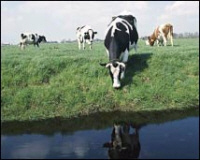



Giant Livestock Farms Passing Buck On Pollution
US - It's an unpleasant subject-one that polite company often avoids. But this fall Congress will be asking the question: Who should pay to clean up water polluted with livestock manure — those who caused the pollution, or the taxpayers whose drinking water and streams are polluted? The answer should be obvious. |
| Who should pay for the clean up? |
If you contaminate water, you should be responsible for cleaning it up. That's the law. But under pressure from the livestock industry, Congress is poised to add a provision to the Farm Bill that creates a special exemption from the polluter-pays law and absolves all livestock operations of responsibility for improper management of manure. Citizens whose drinking water and rivers have been harmed by the factory farm industry need help to fight this amendment.
Historically, farmers have used their animals' manure to fertilize their crops, but crops can only absorb a limited amount of such nutrients. In today's livestock industry, it's common to find tens of thousands of hogs and dairy cows or millions of chickens crowded into industrial-style facilities, which can generate as much manure as small cities. When the amount of manure generated exceeds the crops' ability to absorb it, excess phosphorus, nitrogen and other chemicals including arsenic can pollute the water.
When this happens, someone must clean it up. Currently the polluter-pays law known as Superfund is the only vehicle that cities and states can use to recover cleanup costs from manure-related pollution. Neither the Clean Air Act nor the Clean Water Act authorizes the state or federal government to seek recovery of damages. This means that without the polluter-pays law, local communities are left holding the bag.











